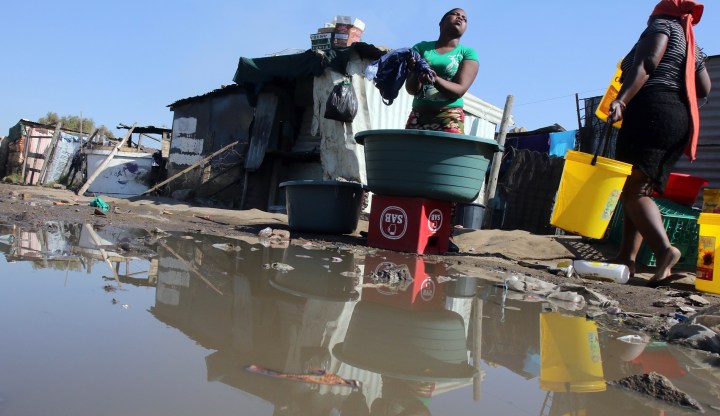OP-ED
Mr President, innovative sanitation is also a big game changer

Very few countries will masterfully craft a strategy and process which will turn a challenge into an industrial opportunity, which grows the economy, creates jobs and provides universal access to equitable sanitation to all – while solving a water security issue.
“Is this the future of small-town South Africa? When the taps run dry and the lights go out,” asked a recent media article referring to situations in Bethal, Beaufort West, Makhanda and several other towns in the Eastern Cape, Free State, North West, KZN and Mpumalanga.
We need to recognise that this situation is on our doorstep and will continue to escalate due to poor governance, poor capacity, competencies, poor operations and maintenance, non-payment, and the lack of uptake of innovations and new solutions. We continue to spread and share the gospel that we are a water-rich country, hiding behind our history and continuing a behavioural culture which continues to distance us from our constitutional imperative of “some for all forever”.
We need to acknowledge that now and in the near future the water crisis and water security will be key risk factors for the socio-economic stability of South Africa. Emerging into a new dispensation of 1994, we have made many strides towards creating a secure water future for all South Africans – we changed the law, we drove new infrastructure programmes, increased access to water and sanitation. However, the challenge is far from over as we deal with the last-mile issues and those related to that of climate reality.
So, Mr President, why am I and a group of international professionals (including Bill Gates, whom you met at the 32nd ordinary session of African Union heads of state) so passionate about innovative non-sewered sanitation? It is, as someone mentioned, that “it is a sin that in today’s modern times we continue to flush our human waste in times of growing water constraints”.
The sector’s infrastructure-driven culture has blinded us from adopting innovation and disruptive solutions; a quality South Africa has been recognised internationally for since the early 1970s, for its pioneering work in water management, wastewater treatment and water reuse.
That is our crisis, continuing to perpetuate this “sin” – where our objective at the city level has become to keep the effluent flowing (ask Cape Town and many other modern cities). The lack of technology shifts and solutions is one of the key factors, which also contributes to poor and undignified sanitation in informal and rural settlements, rural schools, clinics, hospitals and households. This lock-in stems from homeland style standards and regulations that perpetuate the development of two types of citizens in our country – the haves and the havenots.
It is time for some SaNiTi in the sanitation sector. Through the use of innovative technical solutions, we can shift the paradigm in which we serve our towns and cities towards more responsible use of our water while achieving the main aim of sanitation: protecting public health and the environment. There is an opportunity to grow a resource recovery and usage industry, and service industry for operation and maintenance through the use of innovative products which result in smart supply chain management.
The Sanitation Transformation Initiative (SaNiTi) is an approach conceptualised by the Water Research Commission (WRC) which aims to disrupt the current sanitation paradigm by presenting a new pathway that incorporates the elements described here:
-
Off-the-grid sanitation that meets user needs and expectations
-
Circular economy principles in which products in the value chain are recycled or re-used with the addition of other revenue streams
-
Establishing market needs and demands.
-
Presenting an R&D pathway to achieve technical, policy and procurement targets in line with our vision.
SaNiTi presents a national strategic direction for the South African sanitation sector and stimulates a new industry platform for various partners and stakeholders to break away from the current engineering and economic paradigm. A new paradigm for sanitation which is proposed is based on technology disrupters which can safely treat human excreta and matches user preferences without the need for sewers, and limited reliance for external water and energy supply. Through innovation and smart chain supply, universal access can be achieved sustainably and linked to water security and business opportunities.
The opportunity opens up for leapfrogging these solutions in growing urban and rural settlement of the developing world, reducing water consumption and eliminating pollutant pathways. On the back of this transformative initiative is the opportunity for a digital platform which will enable behavioural change and service credibility.
This, Mr President, is a social game changer which alone will free up nearly 30% to 50% of treated freshwater in our water environment and eliminate pollution pathways from our overburdened water courses, contributing to more long term security in water quantity and quality. For an estimated 10 million new toilet seats/systems, I conservatively estimate generating nearly 300,000 new jobs and several new social enterprises.
Our time is now, and I am of the view that we need some decisive leadership from municipalities and government to stimulate and invest greatly in the sanitation innovations space if we want to build a water and sanitation secure world. DM
Jay Bhagwan is Chair of the International Non-sewered Sanitation Specialist Group and Executive at the Water Research Commission. The Global and African sanitation community will meet in Cape Town at the CTICC from 19 to 22 February to advance this agenda under the name the International Faecal Sludge Management Conference.
















 Become an Insider
Become an Insider